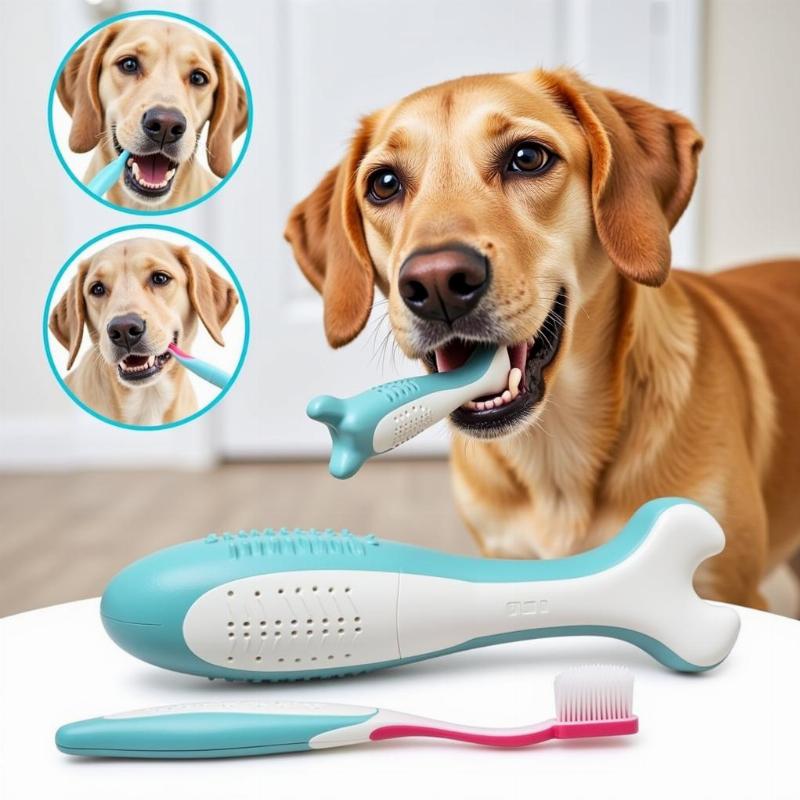Recognizing the subtle signs of a toothache in your furry friend can be challenging. Unlike humans, dogs can’t verbally express their discomfort, so they rely on behavioral changes to communicate pain. Understanding how to tell if a dog has a toothache is crucial for providing prompt care and preventing further complications. This article will guide you through the common symptoms, diagnosis, and treatment options for canine dental issues.
Common Signs of Toothaches in Dogs
Dogs are masters at hiding pain, making it essential to be observant. A change in eating habits is often the first noticeable sign. Your dog might start dropping food, chewing on one side of their mouth, or avoiding hard kibble altogether. They may also show a decreased appetite or even refuse to eat. Look out for excessive drooling, pawing at the mouth, facial swelling, and changes in behavior like increased irritability or reluctance to play.
Diagnosing a Dog’s Toothache
If you suspect your dog has a toothache, a visit to your veterinarian is crucial. They’ll conduct a thorough oral examination, checking for broken teeth, gum inflammation, abscesses, and other dental problems. Dental X-rays are often necessary to identify issues hidden beneath the gum line, like root infections.
Treatment Options for Canine Dental Pain
Treatment depends on the underlying cause of the toothache. For minor issues like gingivitis, professional cleaning and improved home dental care may suffice. More severe problems like abscesses or fractured teeth may require extraction or root canal therapy. Your veterinarian will recommend the best course of action based on your dog’s specific needs.
Preventing Dental Problems in Dogs
Regular dental care is essential for preventing toothaches and other dental issues in dogs. Brushing your dog’s teeth daily with a pet-safe toothpaste is the gold standard. Providing dental chews and toys can also help remove plaque and tartar buildup. Regular veterinary checkups, including professional dental cleanings, are crucial for maintaining optimal oral health.
 Maintaining dog oral hygiene
Maintaining dog oral hygiene
Home Care Tips for Dogs with Toothaches
While waiting for your veterinary appointment, you can take some steps to ease your dog’s discomfort. Offer soft food or soak their kibble in warm water to make it easier to chew. Avoid giving them hard toys or treats. You can also apply a cold compress to the affected area to help reduce swelling and pain.
When to Seek Emergency Veterinary Care
If your dog experiences severe pain, facial swelling that obstructs breathing, or bleeding from the mouth, seek immediate veterinary attention. These could be signs of a serious infection or injury requiring urgent care.
Conclusion
Learning how to tell if a dog has a toothache empowers you to provide prompt care and prevent further complications. By being attentive to their behavior and seeking professional veterinary care, you can ensure your furry companion maintains optimal oral health and enjoys a pain-free life. Remember, regular dental care is key to a happy and healthy smile for your beloved dog.
FAQ
- How often should I brush my dog’s teeth? Ideally, you should brush your dog’s teeth daily.
- What are the best dental chews for dogs? Look for Veterinary Oral Health Council (VOHC) approved dental chews.
- Can I use human toothpaste on my dog? No, human toothpaste contains ingredients that are toxic to dogs. Always use pet-safe toothpaste.
- How much does a dog dental cleaning cost? The cost varies depending on the location and the extent of the cleaning, but it typically ranges from $200 to $500.
- What are the signs of a serious dental infection in dogs? Severe pain, facial swelling, difficulty breathing, and bleeding from the mouth are signs of a serious infection.
- How can I prevent my dog from developing dental problems? Regular brushing, dental chews, and professional cleanings are the best ways to prevent dental problems.
- Can toothaches affect a dog’s overall health? Yes, untreated dental infections can spread to other parts of the body and cause serious health problems.
Beautdogs.us is your premier destination for comprehensive dog care information. We offer expert advice on dog breeds, grooming, nutrition, training, and health, empowering dog owners across the US with the knowledge they need to provide the best possible care for their furry companions. Whether you’re a new dog owner or a seasoned expert, Beautdogs.us is your trusted source for all things dog-related. Contact us for any questions or assistance: Email: [email protected], Phone: +1 501-555-7529.